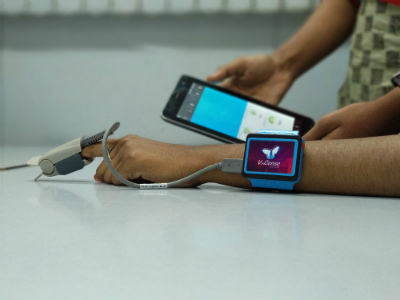IIT Madras develops algorithm for India’s first Health monitoring wearable device
Chennai: Indian Institute of Technology Madras has developed the algorithm for the country’s first medical-grade, wearable device with algorithms for deriving vitals in a non-invasive manner, called “VinCense.”
Developed jointly with MedIoTek Health Systems which works on mobile health technology, VinCense can be used for unobtrusive monitoring. Vital signs including pulse-rate, oxygen saturation, respiratory rate, skin temperature, blood pressure and others are duly recorded through this device. The real-time data are stored in the patent-pending secured cloud from where healthcare providers can access vitals using an intuitive interface.
VinCense can be deployed for Home Healthcare delivery, Insurance/Analytics and Corporate/ Industrial Occupational Health Screening. It also has applications for Non-Communicable Diseases Screening and Surveillance, general Public health, and Community Health.
The device was developed by a team led by Prof M. Manivannan, Head of Touch Lab, Biomedical Engineering Group, Department of Applied Mechanics, IIT Madras. Speaking about VinCense, Prof M.Manivannan said that his team is developing algorithms that provide more accurate vitals from the wearable device.
With the focus on preventive health, India has potential to become a Global Healthcare Hub. Only with a fraction of NIH budget, India can double the efficiency in delivering healthcare services to its population, added Prof Manivannan.
Health screening and monitoring towards preventive and curative care are becoming easier using technologies including from Virtual Reality, Gaming, data-sciences and Internet of Medical Things (IoMT). Sophisticated algorithms combined with latest technologies for accurately deriving vital parameters at an affordable cost is the need of the hour.
MedIoTek has been working on this wearable platform for past four years and the Touch Laboratory at IIT Madras has been working on medical simulation technologies providing haptic feedback for past 13 years. This collaboration would further lead to algorithms for medical simulation applied to wireless health monitoring systems. The outcome of this collaboration could lead to early intervention reducing risks and complications and improving clinical outcomes.
Ms. Sharmila Devadoss, Managing Director of MedIoTek Health Systems, said, “We are extremely excited about our collaboration with IITM to translate crucial research into products that will impact community health and wellness in a transformational way”.
Few applications to mention are close monitoring of high dependency patients – post-op, rehab, step down, vulnerable, tracking just discharged patients, tracking patients in the ambulance. This collaboration between academia and industry can lead to making India the Global Wellness-care Hub, not just Global Healthcare Hub.

